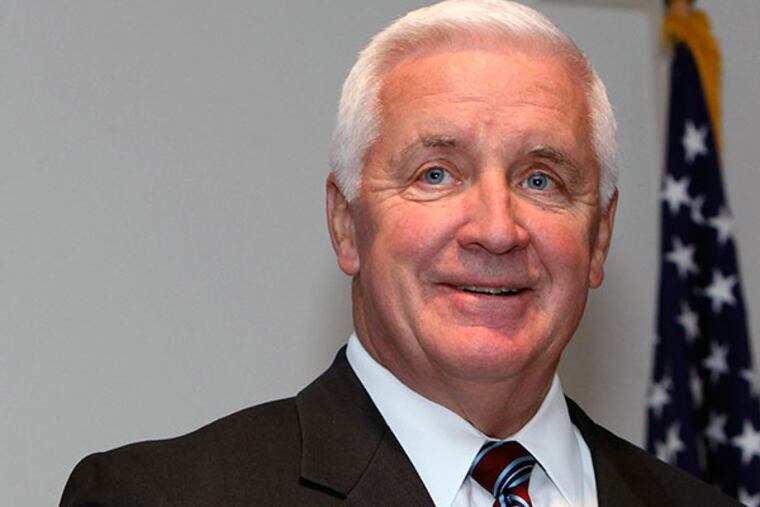Corbett's challenges with legislature in 2014
HARRISBURG Just over a year ago, Gov. Corbett told an audience at a Pennsylvania Press Club luncheon that his top priorities for 2013 were addressing the state pension crisis and privatizing state liquor stores.

HARRISBURG Just over a year ago, Gov. Corbett told an audience at a Pennsylvania Press Club luncheon that his top priorities for 2013 were addressing the state pension crisis and privatizing state liquor stores.
Neither has come to pass.
But while the Republican governor has struggled to move his bills in a legislature controlled by his own party, racked up several major losses in court, and been unable to shake low poll numbers, he did score a late-year legislative victory with the passage of a long-awaited transportation funding bill.
"Until the transportation bill passed, you have to say the governor's legislative successes were very few in terms of agenda items," said Chris Borick, a political science professor and pollster at Muhlenberg College.
That signature achievement will pump $2.3 billion into roads, bridges, and mass transit.
It also brings with it a likely political downside as Corbett embarks on his quest for a second term next year. To pay for the improvements, gas prices are all but certain to go up with the lifting of the cap on the oil-franchise tax. Motorists will also see higher license and registration fees.
"He broke his campaign promise not to raise taxes or fees. Now, he has to rise above that," said Borick. "He may be forced to be more aggressive, given his standing in the polls, but those efforts bring political costs for him, and that's a tricky position."
The governor must brace for attacks from the right - most vocally from his recently announced GOP primary opponent, conservative activist Bob Guzzardi - while at the same time responding to eight announced Democratic primary contenders who will press Corbett's political Achilles heel: the steep cuts he made to funding for education and social services.
When Corbett unveils his fourth budget in February, he will face the need to patch a projected $1.2 billion deficit without any more new taxes, while holding on to his political base - conservatives - and attracting the moderate Republicans and independents he needs to win.
And he will need the support of a majority of the legislature, where all 203 seats in the House and half of the 50 in the Senate also will be up for election.
Budget Secretary Charles Zogby said pension costs for state and public school employees, coupled with increased costs for health care to the poor, would put the state in the red for the fiscal year that begins July 1.
Pension costs are driving the deficit, and the "pressure and necessity" of resolving the pension issue is heightened by the looming deficit, Senate Majority Leader Dominic Pileggi (R., Delaware) said Thursday.
"The overarching issue in the first half of the calendar year will be coming up with a timely balanced budget with no new taxes," he said.
Corbett and the legislature may turn again to gambling for new revenue.
Last year, the legislature passed the first major expansion of gambling since the addition of table games in 2010, when it voted to approve small games of chance in taverns.
Now it may look to legalizing online casino gambling, as New Jersey did, or adding the lottery game keno, which Pileggi mentioned as an agenda item.
A Senate panel approved a resolution this month asking the legislative budget and finance committee to study online gaming.
Pileggi and House Majority Leader Mike Turzai (R., Allegheny) said Republicans want to continue to stimulate job growth as they have with prior business tax cuts.
For Pileggi, that means lifting the $60 million cap on the film tax credit, to draw more movie production to Pennsylvania.
Pileggi and Turzai said they also want to revive the stalled liquor privatization plan and take action on a cyber charter school reform bill.
As he turned toward his reelection campaign, Corbett made several moves in the second half of the year signaling a tacking toward the political center.
First, after long objecting to its cost, Corbett announced that he would expand Medicaid coverage for roughly 500,000 uninsured Pennsylvanians, under his own plan to use federal money to pay for private insurance.
Then Corbett unexpectedly announced that he would support legislation to end discrimination based on sexual orientation in employment and housing - something Pileggi said the Senate might take up early in the year.
The administration has also endured several legal setbacks - including a decision by a federal judge to dismiss his suit against the NCAA over Jerry Sandusky-related penalties on Pennsylvania State University. And it remains locked in other court battles, such as one over the state's ban on same-sex marriage.
Also unresolved are a dispute over the voter ID law, which remains in the hands of the courts, and a plan to privatize the lottery.